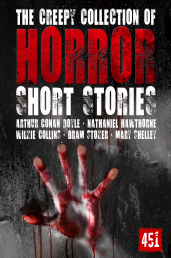Our latest anthology to hit the shelves, Robots & Artificial Intelligence, features stories packed with philosophy, humour, sadness and humanity. Questions surrounding the nature of sentience and the risks and rewards of technological advancements give rise to a range of imaginative tales, set in worlds not far removed from the present day. This first part of a Q&A with the anthology's authors gives us fascinating insight into the thought-provoking story ideas that form the core of the Robots & Artificial Intelligence anthology theme.
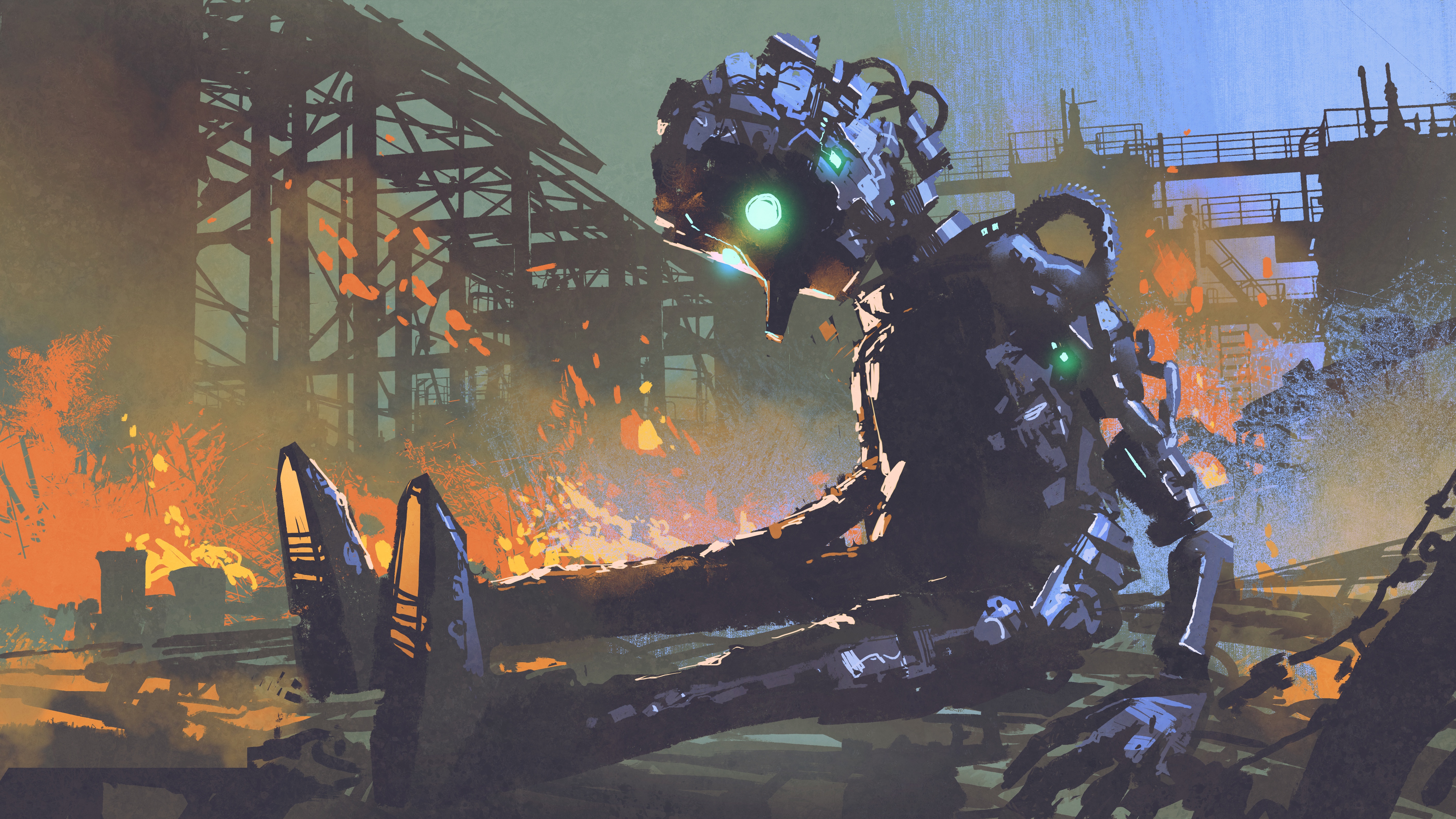
What was the inspiration behind your Robots & AI story?
Roan Clay – Why Should Steel Birds Dream?
Robots, poetry and speculative landscapes have always interested me, and I became intrigued by the idea of putting all these inspirations together. I wanted to create a world where poetry held a vital place. This led to the idea that if artificial intelligence was modelled on the human mind, it would need poetry to maintain its dreams, just as humans do. Out came a story where poetry and dreams were matters of literal life and death.
George Cotronis – Prototype
This was my take on Ray Bradbury's ‘There Will Come Soft Rains’, essentially. A story about a robot that keeps doing its job even though humanity is long gone. Only perhaps this robot was more human than machine, or is at least confused about it.
Deborah L. Davitt – Demeter's Regard
I've written many AIs before, and the notion of what makes someone a ‘real person’ has always fascinated me. In this case, someone had challenged me to reverse a common trope, and I selected ‘What is this thing called love?’ And instead of an AI learning to love, Demeter's programming requires her to love, from the outset, as a control device. For the protection of those she serves. No matter the cost to her.
Jeff Deck – Persona Ex Machina
I took an online course on inbound marketing that recommended creating a ‘buyer persona’ to describe your typical customer in terms of age, gender, lifestyle, buying habits, etc. Then it occurred to me, what if this persona took on a life of its own? What if it wanted to be more than just what it bought?
Christopher M. Geeson – The Perfect Reflection
I was looking in the mirror and suddenly wondered: What if it was looking back at me, judging me? When you use a mirror, you really let your guard down – it reflects versions of you that you wouldn’t let anyone else see. We already live in a violent world obsessed with appearance and surveillance, so it was natural to wonder what mirrors might witness in a future world like that.
Bruce Golden – Owen
This tale was actually inspired by something very personal. Near the end of my mother's life, she became too debilitated to be cared for at home, and had to go into a nursing home. It was a state-paid-for facility, and not the best. It was very tough for her, because her mind was still sharp, but her body was crippled and she had very little control of it. I began to wonder if the human care she was getting was any better than robotic care would be. I imagined, in the future, as our population begins to age, our elderly will likely be warehoused in large facilities and cared for by machines.
Rob Hartzell – The Geisha Tiresias
‘The Geisha Tiresias’ started out as something like a jam session: I came up with the phrase ‘Call us Tiresias’ while brainstorming random notes about uploaded intelligences (for a story-cycle I'm now shopping around), and after a number of associative leaps/mental riffs on the original Tiresias' gender-swap and high-end robot brothels, I had an idea of what my narrator wanted to talk about. All I had to do from there was let hir speak....
Rich Larson – Dispo and the Crow
This story is basically WALL-E with corpses, but the very first spark of inspiration came from looking at concept art for tree-planting robots. Then I had the idea of one of those robots being re-purposed to bury dead bodies following some sort of disaster. Then I had the idea of it having a kind of rivalry with the carrion birds who were also interested in the bodies. ‘Dispo and the Crow’ soon followed.
Monte Lin – Adrift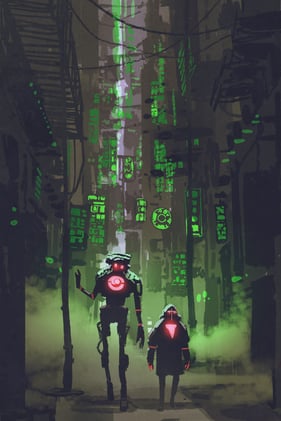
To be honest, I had a lot of misgivings about writing a story involving depression and suicide. Depression feels like someone has hacked into your brain and put in some bad, looping code. Would an AI think the same thing? Depression (for me, at least) also turns you into your own worst enemy, and that formed the relationship between Hayden and Percy.
Trixie Nisbet – EQ
To fit the premise of this anthology, I gave my teenaged protagonist a mother who was an AI pioneer and a father working in robotics. This was all wildly futuristic, so I also gave Katie a very human, down-to-earth problem, and speculated on how her parents might deal with it. I liked the idea of looking to the future, so Time crept into the story too. I jiggled with these elements until the story finally fell into place as a logical whole.
Chloie Piveral – A Woman of One's Own
‘A Woman of One’s Own’ was inspired by the question ‘What if people could own and control your very consciousness?’ I saw a picture of an older woman holding a sign that read, ‘I can’t believe I’m still fighting for this shit!’ Meaning – autonomy. I think of technological advances as making the world a better place, but they don’t guarantee a more socially advanced society. Sometimes we have to fight within ourselves to make that happen.
David Sklar – I, Coffeepot
When I was a teenager, I read an article about artificial intelligence researchers who’d decided that the existing approaches to AI were dead ends, and instead of trying to make a machine that thinks like a human, they should make a machine that works like an insect, and work their way up. So they built robots the size of a shoe, gave them simple operating parameters, and let them loose in the lab to see what they’d do. Years later I got to thinking about what differentiates organic intelligence from computer intelligence, and it seemed to me that the answer is operating parameters. We don’t have them. Or really, we do, but they’re not really clear beyond basic survival, and even that gets muddled sometimes, whereas computers have very clear operating parameters, and have to work within them. And it struck me that if we want to create artificial intelligence with real sentience, then the key might lie in dilemmas that can’t be solved – the grey areas in which human beings operate every day. Or, that’s what I thought at the time. Since then, there have been some frightening advances in artificial intelligence – though they still seem to be startling in their ability to out-think the people who designed them, not in their ability to feel or communicate emotion or compassion.
Claire Allegra Sorrenson – She Swims
Why make art? To what end? And how do we do it in a world that urges us to produce, to stop lingering, to move always forward and up? This story explores what happens when these questions become too loud to ignore – and how one intrepid robot responds. At some point in our lives, I think we’ve all yearned to do something the world tells us we’re wildly unsuited for. The proof? About a month after I finished this story, a friend mentioned this real-life robot who rolled into a fountain. Perhaps, like 2B, all she was trying to do was swim.
Sara L. Uckelman – Being Human
The story came directly out of my own struggles navigating the complicated calculations involved in interacting with other people. I wanted to write a story that could be straightforwardly – and rewardingly – read as a robot AI upgrading her body for a new biological one, but where all of the worries and fears that Laura has of doing the right thing, moving the right way, saying the right thing came directly out of my own worries and fears and difficulties.
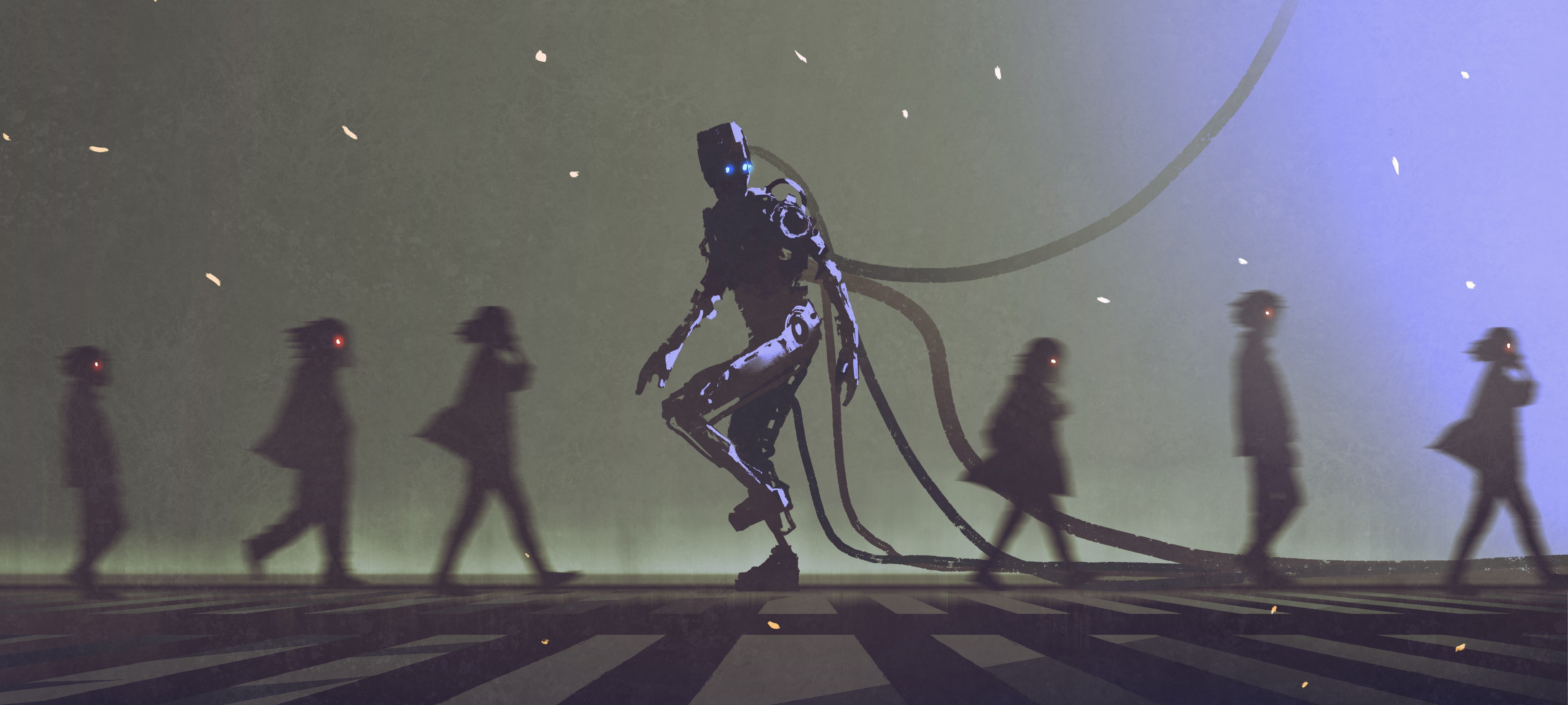
Holly Lyn Walrath – Stardust
The title of my story ‘Stardust’ comes from the jazz song of the same name, popularised by legends like Louis Armstrong, Bing Crosby, and Artie Shaw. I love the line ‘Love is now the stardust of yesterday, the music of the years gone by.’ As I wrote, I wanted to capture the nostalgic feeling of yesteryear, while still keeping a futuristic world. And of course, what’s more romantic than a robot in love?
Nemma Wollenfang – GOD is in the Rain
In an age where our technology is continuously leaping forward, and ever more grandiose ideas are birthed into reality, it’s easy to imagine them not just going wrong, but going terribly wrong. We writers play with this idea a lot. All-out cataclysm is the usual result. But what about a future where the end-of-the-world is not so… obvious? Where the destruction is subtle rather than blatant? So stealthy it almost goes unnoticed. I find that idea much more terrifying. That is what inspired GOD is in the Rain.
Eleanor R. Wood – Daddy's Girl
The possibility of humanlike androids and the achievements of scientists like Hiroshi Ishiguro have long fascinated me, as has the subject of consciousness. We're still exploring what consciousness really is; the idea that it might be separate from our physical bodies and capable of being transferred elsewhere is both frightening and rife with potential. Combining those concepts with the deeply human ones of loss, family, and our drive to succeed brought this story to life.
There'll be more from the Robots & AI authors next week, where they discuss their favourite tales and writing practices in Part 2 of the Author Q&A!
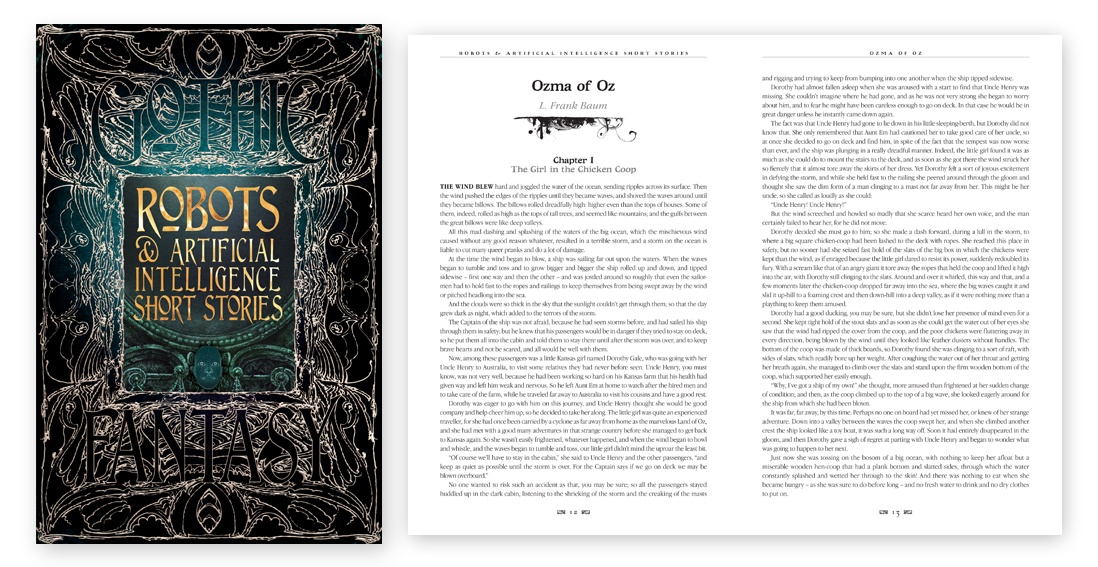
Links
- The new Robots & Artificial Intelligence anthology is now available to buy from our website.
- See this anthology's full list of contemporary and classic authors here.
- Robots & AI was published alongside the Lost Souls volume. For Q&As with the Lost Souls authors, see Part 1 and Part 2.
- We recently announced the selection for 2 upcoming 2019 anthologies – Haunted House, and Cosy Crime – here.
Images courtesy Shutterstock.com




